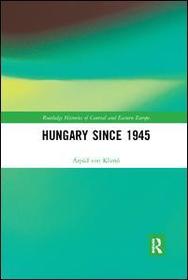
Hungary since 1945
Sorozatcím: Routledge Histories of Central and Eastern Europe;
-
10% KEDVEZMÉNY?
- A kedvezmény csak az 'Értesítés a kedvenc témákról' hírlevelünk címzettjeinek rendeléseire érvényes.
- Kiadói listaár GBP 42.99
-
20 538 Ft (19 560 Ft + 5% áfa)
Az ár azért becsült, mert a rendelés pillanatában nem lehet pontosan tudni, hogy a beérkezéskor milyen lesz a forint árfolyama az adott termék eredeti devizájához képest. Ha a forint romlana, kissé többet, ha javulna, kissé kevesebbet kell majd fizetnie.
- Kedvezmény(ek) 10% (cc. 2 054 Ft off)
- Kedvezményes ár 18 484 Ft (17 604 Ft + 5% áfa)
Iratkozzon fel most és részesüljön kedvezőbb árainkból!
Feliratkozom
20 538 Ft

Beszerezhetőség
Becsült beszerzési idő: A Prosperónál jelenleg nincsen raktáron, de a kiadónál igen. Beszerzés kb. 3-5 hét..
A Prosperónál jelenleg nincsen raktáron.
Why don't you give exact delivery time?
A beszerzés időigényét az eddigi tapasztalatokra alapozva adjuk meg. Azért becsült, mert a terméket külföldről hozzuk be, így a kiadó kiszolgálásának pillanatnyi gyorsaságától is függ. A megadottnál gyorsabb és lassabb szállítás is elképzelhető, de mindent megteszünk, hogy Ön a lehető leghamarabb jusson hozzá a termékhez.
A termék adatai:
- Kiadás sorszáma 1
- Kiadó Routledge
- Megjelenés dátuma 2019. december 12.
- ISBN 9780367884369
- Kötéstípus Puhakötés
- Terjedelem234 oldal
- Méret 234x156 mm
- Súly 440 g
- Nyelv angol 379
Kategóriák
Rövid leírás:
Lying on the political fault line between East and West for the past seventy five years, the significance of Hungary in geopolitical terms has far outweighed the modest size of its population. This book charts the main events of these tumultuous decades including the 1956 Uprising, the end of Hungarian communism, entry into the European Union an
TöbbHosszú leírás:
Lying on the political fault line between East and West for the past seventy-five years, the significance of Hungary in geopolitical terms has far outweighed the modest size of its population. This book charts the main events of these tumultuous decades including the 1956 Uprising, the end of Hungarian communism, entry into the European Union and the rise to power of Viktor Orbán and the national-conservative ruling party Fidesz.
TöbbTartalomjegyzék:
Introduction 1: 1956 – Key Event in Hungarian Postwar History 2: The Hungarian State: Caesuras and Continuity 3: Foreign Policy: From World War II to the European Union 4: From Capitalism to the Planned Economy and Back Again: Economic and Social Policy 1945-1989 5: Social Structures and Mobility 6: Lifestyles in Transition 7: Ethnic Homogenization and Minority Policy Within Hungary and Neighboring States 8: Churches and Religion 9: Hungarian politics since 1989 Bibliography
Több



